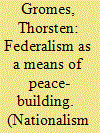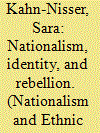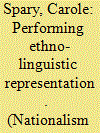|
|
|
Sort Order |
|
|
|
Items / Page
|
|
|
|
|
|
|
| Srl | Item |
| 1 |
ID:
101442


|
|
|
|
|
| Publication |
2010.
|
| Summary/Abstract |
English national identities are frequently viewed as becoming problematic since the major transformations in the relations between the nations within and beyond Britain. Recent research suggests forms of national attachment and detachment have different degrees of salience among ordinary people in England than within elite circles. This article explores and extends this assertion through the qualitative study of the accounts of English migrants in New Zealand. Research findings confirm that the presence or absence of national identifications are closely related to everyday lives but show how experiences of migration are translated into sentiments in distinctive and diverse ways.
|
|
|
|
|
|
|
|
|
|
|
|
|
|
|
|
| 2 |
ID:
101427


|
|
|
|
|
| Publication |
2010.
|
| Summary/Abstract |
Ethnic identity is often cited as an important variable explaining voter choices in Africa. Ethiopia, since 1994, has adopted an ethnically-based federal system, which makes it an interesting test case of the importance of ethnicity in shaping voter preferences. Indeed, one might expect higher levels of ethnification of voter preferences in Ethiopia when compared to other African countries. Using cross-national data from the World Values Survey and Afrobarometer, it is found that Ethiopian voters have relatively higher levels of concentrated partisan support than do other African countries. However, when examining the propensity of individual voters to express partisan preferences that "defect" from their ethnic position, I find that the evaluations of government performance explain defections better than does the intensity of ethnic identity or expectations for patronage.
|
|
|
|
|
|
|
|
|
|
|
|
|
|
|
|
| 3 |
ID:
101443


|
|
|
|
|
| Publication |
2010.
|
| Summary/Abstract |
The colonial experience in the Torres Strait exemplifies the role played by imposed territorial, classification, and administrative boundaries in contributing to the formation of imagined communities among colonized indigenous peoples. These boundaries have provided the basis for a shared colonial experience that was readily transformed into the conscious boundaries of an imagined Torres Strait Island community. The Torres Strait experience also suggests that in seeking to understand the formation of imagined communities in an indigenous colonial context, there are a series of phases that can be identified. These phases can be thought of as cultural tremors-tremors that over a sustained period redefine the cultural landscape.
|
|
|
|
|
|
|
|
|
|
|
|
|
|
|
|
| 4 |
ID:
101433


|
|
|
|
|
| Publication |
2010.
|
| Summary/Abstract |
As federalism offers a compromise between a unitary state and secession, it plays a prominent role in agreements on terminating civil wars between ethnically-defined parties to the conflict. This article examines the impact of federalism on peace-building in postwar Bosnia and Herzegovina. It argues that in the chosen case federalism in conjunction with a consociational democracy, peacekeeping troops, and the prospect of integration into the European Union brought about a partial success of peace-building. Although the federal system did not work well, it seems plausible that Bosnia and Herzegovina would be worse off with a unitary state or a partition.
|
|
|
|
|
|
|
|
|
|
|
|
|
|
|
|
| 5 |
ID:
101441


|
|
|
|
|
| Publication |
2010.
|
| Summary/Abstract |
Recent waves of new immigration distinct from postcolonial-era migrations can be identified in many Western countries. More than 40 such "new immigrant" candidates contested the 2009 local government elections in the Republic of Ireland. This article draws on interviews with just under half of these and on official responses from each of the Republic's five political parties to a study of "new immigrant" participation in Irish politics. It also draws on a specific locality case study of the border town of Dundalk where support for Sinn Fin, Ireland's most distinctly ethno-nationalist political party, is relatively high. Our analysis of "new immigrant" candidate participation in Irish politics suggests that a number of factors influence responsiveness to these; this article focuses on the salience of theories of racialization, ethnic nepotism, and localism. In particular, the findings emphasize how local identities as manifested by immigrant candidates potentially mediate racial and ethnic barriers.
|
|
|
|
|
|
|
|
|
|
|
|
|
|
|
|
| 6 |
ID:
101438


|
|
|
|
|
| Publication |
2010.
|
| Summary/Abstract |
This article analyzes the electoral performance of the nationalist movement in Corsica. First, we ran an ecological analysis of a new dataset, including observations from all Corsican towns for all regional elections from 1992 to 2004. Second, we complemented the ecological findings with individual-level data. Our results show that the classical combination of economic-based and identity factors that account well for nationalist voting is conditioned in the Corsican case by the existence of two specific phenomena: the tendency of the nationalist movement to experience internal divisions and party splitting, and the extraordinary electoral resilience of local notables, the traditional French-loyal political leaders on the island.
|
|
|
|
|
|
|
|
|
|
|
|
|
|
|
|
| 7 |
ID:
101424


|
|
|
|
|
| Publication |
2010.
|
| Summary/Abstract |
Historic Ethiopia (now Eritrea and Ethiopia) has suffered from extreme forms of ethno-regional nationalism for far too long. By focusing on the interactions between state nationalism, which engendered a plethora of counter nationalisms, and Eritrean separatism (Eritreanism), this article shows the futility of excessive nationalism as the politics of imagined identities that do not necessarily reflect realities and the urgent need to chart a fresh road of dealing with the conditions that engender it rather than blaming those who are forced by circumstances to embrace it as "narrow nationalists" or "tribalists."
|
|
|
|
|
|
|
|
|
|
|
|
|
|
|
|
| 8 |
ID:
101436


|
|
|
|
|
| Publication |
2010.
|
| Summary/Abstract |
This article puts forward an in-depth examination of the Wadi Salib events. The recently disclosed proceedings of the Wadi Salib Committee of National Inquiry are interpreted to show how the Oriental Jews (Mizrachim) explained their actions in Zionist terms centered on Jewish kinship. The Western Jews (Ashkenazim) in turn, rejected the Oriental Jews' sense of alliance and underlined the colonial element of Zionist identity. Identity threat theory is incorporated to explain how the two opposing views of Zionism may have been constructed and how these may have contributed to the outbreak of the Wadi Salib events. Some conclusions regarding the nature of Israeli national identity, Ashkenazim-Mizrachim relations, and Majority-Minority, Immigrants-Veterans relations emerge.
|
|
|
|
|
|
|
|
|
|
|
|
|
|
|
|
| 9 |
ID:
101431


|
|
|
|
|
| Publication |
2010.
|
| Summary/Abstract |
Scholars have argued that the outbreak of civil wars destroys the possibilities for ethnic cooperation and conclude that the most effective remedy for ethnic civil conflict is to redraw national borders. Building upon the Kurdish conflict in Turkey, this article shows that peaceful coexistence after ethnic civil wars is possible as long as the state sufficiently democratizes by respecting the political and cultural rights of the ethnic group. These in-depth interviews with members of the Kurdish political elite, together with other informal conversations with dozens of people, show that, despite decades of conflict, the respondents do not deem ethnicity to be a primary obstacle against a peaceful coexistence.
|
|
|
|
|
|
|
|
|
|
|
|
|
|
|
|
| 10 |
ID:
101428


|
|
|
|
|
| Publication |
2010.
|
| Summary/Abstract |
This article explores the performance of ethno-linguistic representation in the national parliament of India, analyzing language practices in debates and ceremonies. Despite a policy of official multilingualism, strong institutional norms prioritize English or Hindi as the two official languages of parliament. However, regional languages are more popular in some forms of debate and ceremonies than others, particularly in the oath/affirmation as a means of affirming cultural identity. I identify three narratives-functional, instrumental, and affective-that Members of Parliament employ to explain language practices in parliament and to show how parliamentary multilingualism is associated with some ethno-linguistic communities more than others.
|
|
|
|
|
|
|
|
|
|
|
|
|
|
|
|
| 11 |
ID:
101446


|
|
|
|
|
| Publication |
2010.
|
| Summary/Abstract |
This article looks at the perception of Jewish-Israeli nationality and the boundaries of the Israeli collective, as reflected in the media coverage of foreign basketball and soccer players during the years 2002-2006. We show that while foreign athletes play a central role in the efforts of Israeli sport clubs, they remain largely excluded from the Israeli collective. At times they are partially included in the collective via discourses that emphasize their contribution to the "common good." However, this inclusion remains provisional and incomplete. Much like in other countries, it is contingent on excellence on the court. We also show the dominance of a unique ethno-Jewish discourse, demanding that foreign and naturalized players, especially if they are not Jewish, constantly pronounce their loyalty to the state and demonstrate familiarity with the Jewish people and their religion, language, and traditions.
|
|
|
|
|
|
|
|
|
|
|
|
|
|
|
|
|
|
|
|
|